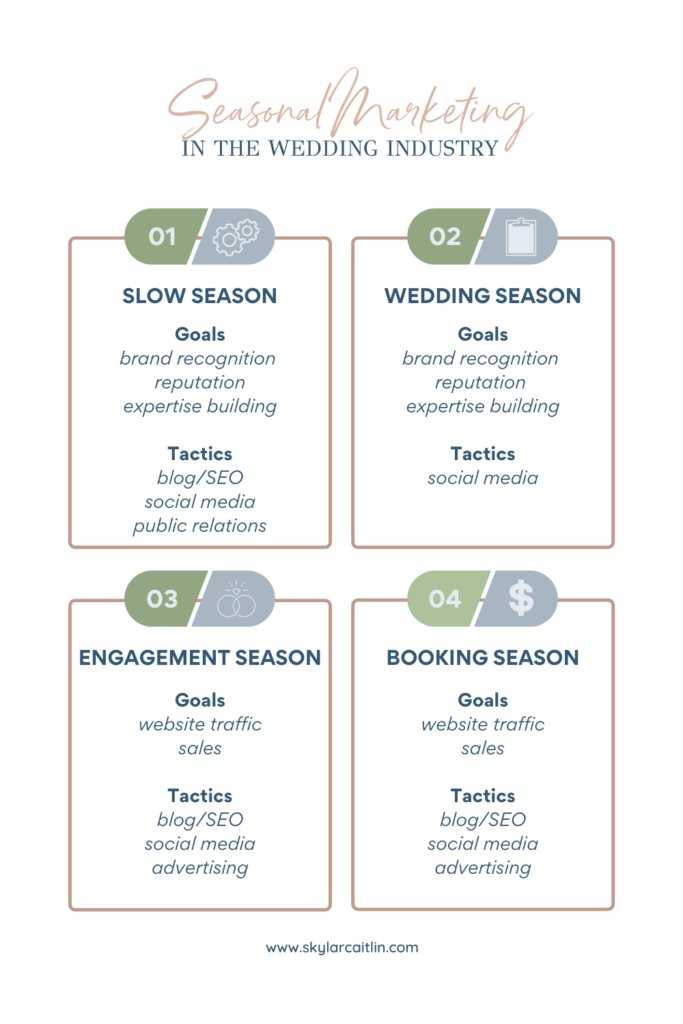As a life-long learner – as I feel most dedicated entrepreneurs are – I came across the idea of cyclical (or seasonal) marketing recently and thought – wow I bet this would be super helpful in the wedding industry. But as I researched cyclical marketing in the wedding industry, my Google searches came up with a big fat goose egg. Until I found one article, written by my internet-pal and marketing super star, Tayler of Taylrd Media.
I DM’d Tayler telling her how I’d love to dive in deeper into the topic and, if she had any more content, I’d eat it up. Tayler’s response, “Why don’t we just chat about it on Instagram Live?”
You mean a free coaching and brainstorm session?!? Sign me up!!
What I have to share below is a recap of this live for those of you whose learning style is more reading and writing. If you’re an auditory learner – check out the Live on Tayler’s Instagram. And no mater your learning style, Tayler has marketing tools & resources you’re going to love!
What is Seasonal Marketing?
(And Why Should Wedding Pros Learn About it?)
Many of us think about our year based on capacity – I have time to work ON my business vs. I only have time to work IN my business. But if we’re looking only at our capacity, we miss the nuance of the full cycle of the year. That is the full cycle from our audiences’ stand point.
Seasonal Marketing – also called cyclical marketing – allows you to be intentional with your efforts and marketing messages you put into the world. The messaging you create each season is focused on meeting your clients where they are.
Long term, working with seasonal marketing allows you to break out of the constant creation cycle of starting fresh each year. Once you have a strong strategy based on your own businesses flow, you can reuse, tweak, and update based on your quarterly needs and goals.
Keep in mind your seasons are 100% dependent on your local market. Slow Season for someone in Texas might be July & August when it’s blistering hot, while for a Maine wedding pro, you’re likely in the height of wedding or busy season in the summer but slower in the winter. You’ll need to identify when these season are for you and apply these goals and tactics to that portion of your calendar. Keep in mind there may be some overlap within these seasons.

Slow Season
AKA when everyone gets to work ON their business. You have less weddings actually taking place and more capacity to work on the behind-the-scenes of your business.
Goals
- Brand Recognition
- Reputation
- Expertise Building
Tactics
Blog/SEO
Since you have more time and space, focusing on long form content is a natural fit for this season. Write blog posts for all your weddings from the busy season as well as posts that point you out as the expert.
Tayler’s Top Tip: Bank blog posts during this time that you can save and schedule during wedding season when you have less capacity to create!
This is also the time to check-in on your websites SEO quality. Are your pages word counts long enough? Do you have any broken links that need updating?
Social Media
For slow season, focus your social media content on some of the bigger problems you help solve for your couples (i.e. your Value Proposition).
Tayler also encourages you to consider featuring client reviews. Don’t have any ready to go? Use this “down time” to follow-up with past clients and get their testimonials for sharing.
Plus, start banking content for busy season!
Public Relations/Relationship Marketing
Magazines are operating seasons ahead, so even if your slow season falls around the winter holidays, they’re already compiling content for their summer publications. Take some time to submit your best work.
This is also a great time to reconnect with your referral partners and industry friends. This could be done through gifting or scheduling some coffee dates to reconnect.
Wedding Season
AKA “busy” season. You have the majority of your weddings taking place now and sometimes it might feel like it’s all you can do to keep your head above the water.
Give yourself grace. This is the season where you don’t need to be everywhere all the time. Keep in mind while you may have less capacity to create your overall marketing goals are the same as slow season, which means our tactics will vary. You can double down and only focus on 1-2 channels or stay with the same number of channels and scale back on your pace.
Tayler’s Top Tip: Marketing has levers like pedals in a car. You can’t have you foot to the floor all the time. Sometimes you have to ease up, slow down, and take it easy.
Goals
- Brand Recognition
- Reputation
- Expertise Building
Tactics
Social Media
New content should be focused more on behind-the-scenes. Stories is a great place to focus as it give people a look at the real-time action of wedding season.
High quality content a few times is more beneficial that just posting to post. Lean on your pre-prepared content from slow season or past content (more on how to share that below), plus whatever you have the capacity to share.
Engagement Season
AKA when the majority of people get engaged each year. In the US, engagement season traditionally runs from Thanksgiving to Valentine’s Day.
Goals
- Website Traffic
- Sales
Tactics
Blog/SEO
Your SEO is key to website traffic. Before Engagement season kicks-off take another check-in to ensure your links are working and your website is ranking high enough to draw in your ideal couples.
Social
Engagement Season is a great time to “lather, rinse, & repeat” content.
Tayler’s Top Tip: If you’ve already written your blog posts in a solid introduction, 3 body paragraph, and conclusion format, you can chop up the post to use on social media as captions. Constantly driving back to the blog (aka your website!).
You can easily create 3-5 social media posts from a single blog post. When a blog post first publishes, the next 3-5 days should include at least 1 Instagram feed post, some Instagram Stories (both sharing the post link and video of you talking about main takeaways), 1 Instagram Reel/TikTok, 1+ pins on Pinterest, link on your Google My Business page.
Advertising
This is the point in time in which advertising becomes something to consider. While you can be on marketplace listings throughout the year, targeted ads on social media and Google only really makes financial sense.
Booking Season
AKA when you’re making $$$. This is when lurkers become inquiries ready to book you for your services.
For many wedding pros our booking and engagement season sees some overlap. For me booking season is usually Q1, meaning that January and the beginning of February are both engagement & booking season for me. This is one of the reasons that the goals (and most of the tactics) are the same for both seasons. The biggest difference: booking season is when it is appropriate for you to explicitly ask for the sale.
Tayler’s Top Tip: This is the time of year when leaning into using more sales-focused language makes the most sense and feels the most organic. Try getting outside of your comfort-zone and ask for the sale.
Goals
- Website Traffic
- Sales
Tactics
Blog/SEO
It is good practice to update your blog posts. Google is favoring longer & longer form content. Your baseline for blog posts should be 500-800 words. Returning to add content (if you can get up to 1000 words, that’d be a big SEO bonus) and refresh content that might be outdated.
The update itself gives Google a nudge that you’ve been making some changes they need to review, but when you pair that with new shares on social media (promotion) that drive traffic to the page it’s like a beacon for Google to come check out what you’re up to.
Social Media
Continuing on the topic of reusing content, sit down with your focus of the month and revisit your blog library. You can use content from blogs that align to short-cut to a great, informative caption for your socials. Just be sure that a blog post has been up for at least a month so there is space between the initial share and the re-share(s).
Advertising
Again, this is the point in time in which advertising might make financial sense for you and your business.
I hope that you enjoyed this breakdown from Tayler & my live conversation on seasonal marketing for wedding professionals. While seasonal marketing is a little like being along for the ride, it’s also about being informed enough to know when to lean in and out of messages and tactics. I’ll leave you with this final thought from Tayler & her therapist…
You can’t have your foot on the gas all the time. You have to take it off. It’s true for cars and people and business. Marketing is very much the same. It’s tied deeply to the cycles of business and what you have the capacity to do at any given time and what your potential clients are looking for.
If you’re looking for a marketing consultant steeped in the world of weddings and small creative business, that’s me. As the Co-Founder of Sourced Co. and the original Marketing Director at Aisle Planner, I’ve spent over six years developing smart solutions to help wedding pros simplify and streamline their marketing and branding efforts. And, while I’ve been called a lot of things (I promise mostly good), what matters to me most is that I live up to what you might have heard.
